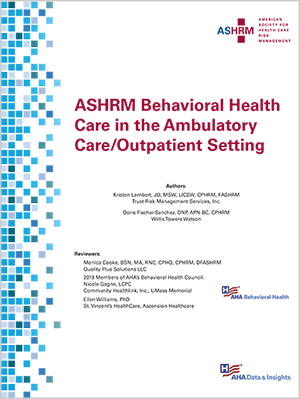
ASHRM Behavioral Health White Paper Series
Nonmembers: Download the ASHRM Behavioral Health Care White Paper
Please enter your information below to receive a download link.

Patients with behavioral health disorders receive treatment in every segment of health care, not just the inpatient setting. An evolution is underway in how our health care system manages patients with behavioral health disorders, because of ever-changing realities and limited resources. The ASHRM/AHA Behavioral Health White Paper Series offers guidelines for managing these patients beyond the inpatient setting and a list of resources to assist providers.
Part 1: Behavioral Health Care in the Ambulatory Care/Outpatient Setting
Providers in outpatient settings such as ambulatory care will likely encounter patients who not only have medical concerns, but also have behavioral health disorders. Some hospitals and health systems are now training primary care physicians to recognize the signs of behavioral health disorders, or embedding a behavioral health clinician in the same office. Part 1 of the series covers the emerging models and considerations for integrating behavioral care in an outpatient setting:
- Collaborative care/integrated care models
- Telebehavioral health and technology
- Providing treatment when behavioral resources are not available
- Special considerations for specific patient populations
Part 2: Behavioral Health Care in the Emergency Department Setting
Emergency departments have seen an increasing amount of patients with psychiatric and behavioral health needs. Even though these patients account for a relatively small portion of total ED patients, these high-risk patients pose a unique set of challenges. As this need continues, hospitals may need to implement creative strategies and rely on newer models of delivery. Part 2 of the series covers the many aspects and considerations required for providing care for behavioral health patients in an ED setting:
- Logistics, safety and staff competency in the ED
- Discharge planning and use of community resources
- Special considerations for specific patient populations, including pediatric and geriatric patients
- Considerations for populations requiring heightened attention and care, such as domestic abuse cases, veterans and forensic patients
Part 3: Behavioral Health Care in the Inpatient Medical Setting - New
Behavioral health disorders present in every area of the inpatient hospital setting. Patients can be admitted for a medical issue and also have behavioral health and/or substance use issues or develop a behavioral issue as a result of being hospitalized or dealing with chronic or terminal illnesses. Part 3 of the series covers the considerations and knowledge required for treating or managing patients who have behavioral health issues:
- Logistics, facilities and staff competency in inpatient settings
- Safety and security, including suicide and homicide risk assessment
- Special considerations, concerning domestic violence and other at-risk populations
Login with your ASHRM Member account to access the ASHRM Behavioral White Paper Series. Non-members may download these white papers by providing their information in the fields displayed on this page.
